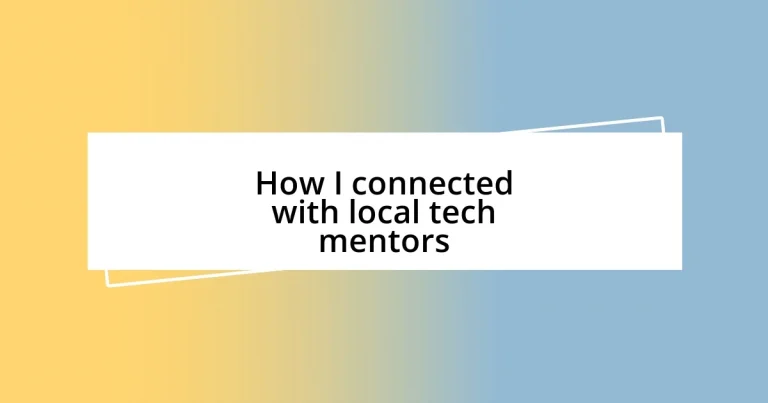Key takeaways:
- Finding the right mentor offers invaluable guidance, opportunities, and support, significantly enhancing career growth.
- Engaging with local tech communities and utilizing online platforms fosters connections that can lead to meaningful mentorships.
- Authenticity, consistency, and active participation in mentorship opportunities are vital for building and nurturing lasting relationships with mentors.
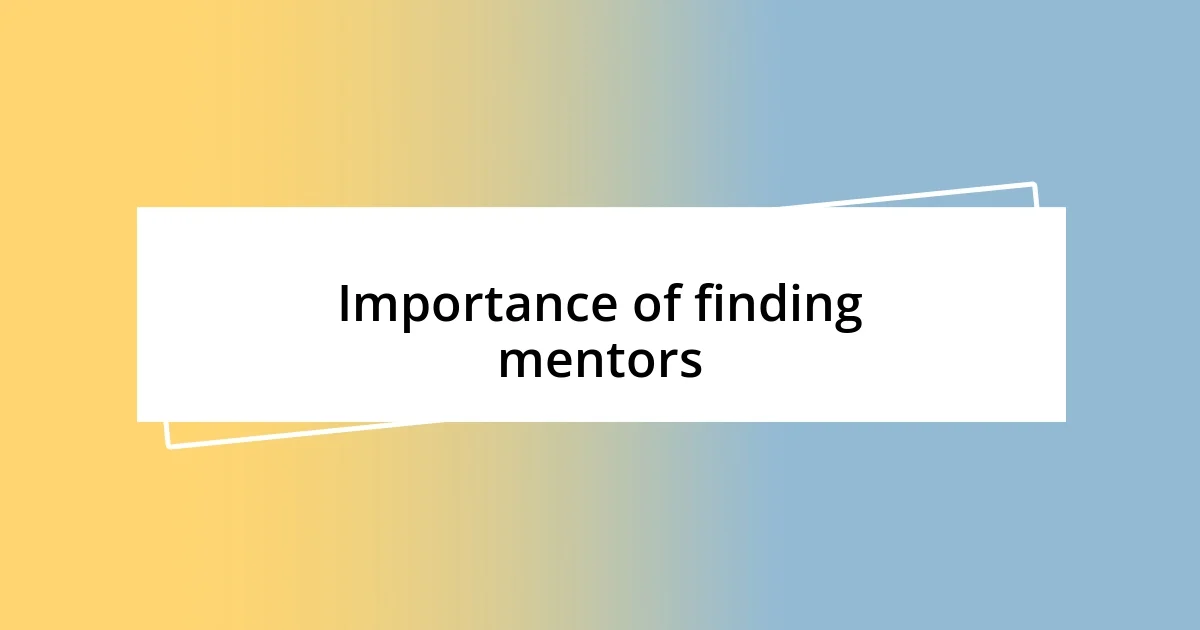
Importance of finding mentors
Finding the right mentor can truly change the trajectory of one’s career. I remember when I connected with a local tech mentor; it felt like discovering a cheat code to the complex game of tech. Isn’t it fascinating how one conversation can spark new ideas and perspectives?
Mentors not only provide guidance; they also expose you to opportunities you might never encounter on your own. For instance, my mentor once introduced me to a networking event that led to my first project as a freelance developer. Have you ever thought about how such connections can elevate your skills and confidence?
Moreover, mentors can serve as a sounding board for your ideas and challenges. When I faced a tough decision on a project, my mentor patiently listened and helped me clarify my thoughts. Isn’t it comforting to have someone who has walked that path before you, ready to share their wisdom and encouragement?
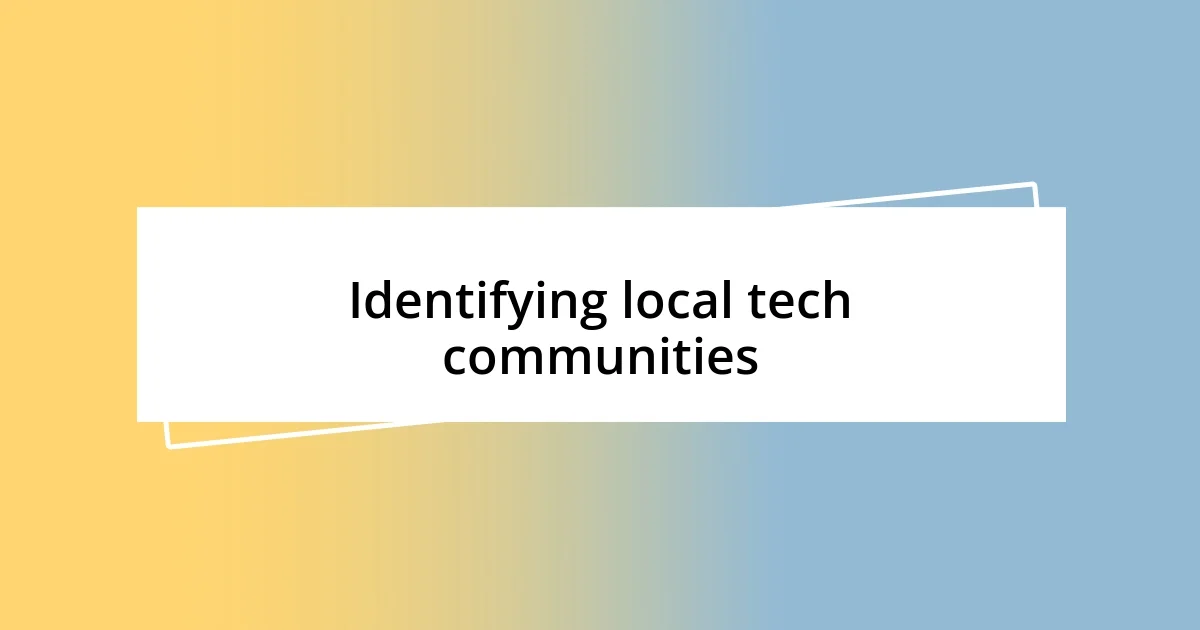
Identifying local tech communities
Identifying local tech communities is an essential step in connecting with mentors. I remember attending a local meetup for software developers, where I discovered an entire universe of like-minded individuals eager to share their experiences. It felt invigorating to converse with people who understood the challenges we face in the tech world, creating an instant sense of belonging.
Finding the right community often involves exploring various platforms, from social media groups to local tech hubs. During my search, I stumbled upon a co-working space that hosted weekly coding nights. These nights were not just about coding; they were a chance to collaborate, exchange knowledge, and, more importantly, form lasting relationships with other tech enthusiasts. The warmth in the room that evening was palpable, as everyone was genuinely interested in lifting each other up.
It’s intriguing how different tech communities can cater to varied interests and skill levels. I’ve seen groups focusing solely on web development, while others dive deep into data science or cybersecurity. By joining a few, I learned that each community offers its own unique vibe and set of resources. Reflecting on my journey, I can confidently say that mingling with local tech groups has been one of the best decisions I made for my career.
| Community Type | Focus Area |
|---|---|
| Meetups | Networking and idea sharing |
| Co-working spaces | Collaboration and skill development |
| Online forums | Support and knowledge exchange |
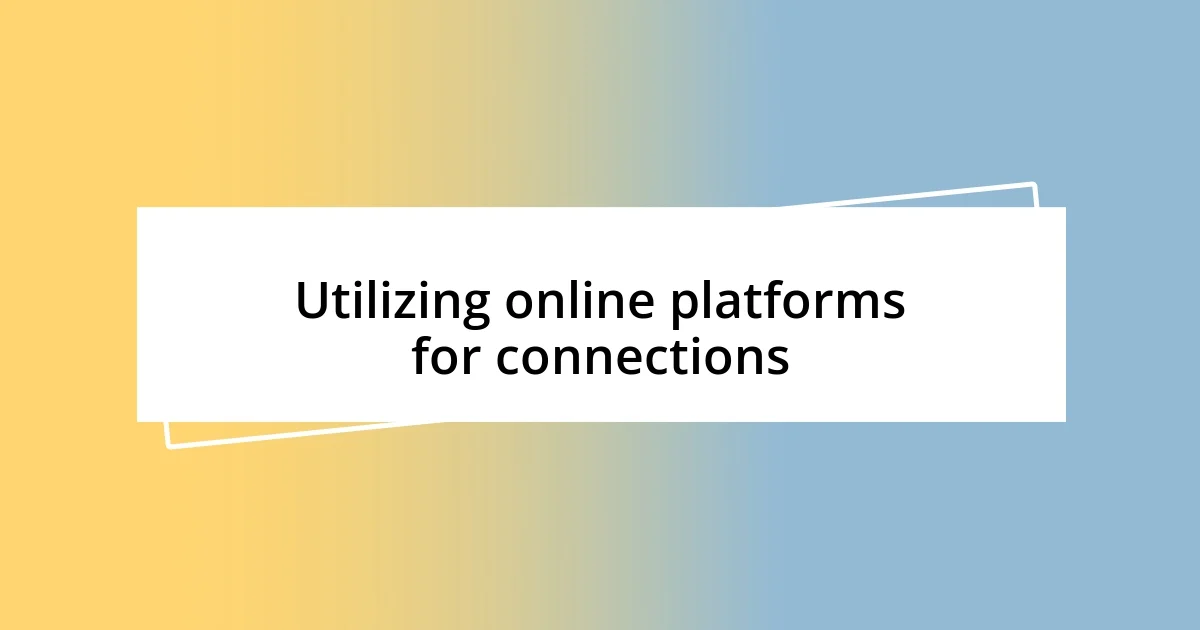
Utilizing online platforms for connections
Using online platforms can be a game-changer when it comes to connecting with tech mentors. I vividly recall the moment I joined a LinkedIn group dedicated to software development. Not only did I gain access to valuable resources, but I also found myself engaging in meaningful discussions that highlighted the collective expertise of its members. The excitement of receiving direct feedback on my projects from seasoned professionals was incredibly motivating.
To maximize your chances of finding the right mentor online, consider these strategies:
- Join relevant groups on social media platforms like LinkedIn or Facebook.
- Participate in online forums and communities, such as Stack Overflow or GitHub, where tech discussions happen.
- Attend virtual seminars and webinars to network and interact with industry leaders.
- Utilize platforms like Meetup or Eventbrite to find online tech-focused events.
- Reach out proactively via private messages, expressing your interest in their work and seeking guidance.
Each click and conversation can lead you one step closer to meaningful mentorship. Online platforms can break geographical barriers, allowing you to connect with experts you might not have access to locally. In my case, a simple tweet about my experience led a well-known industry figure to reach out and offer advice. The power of engaging in these virtual spaces is truly remarkable!
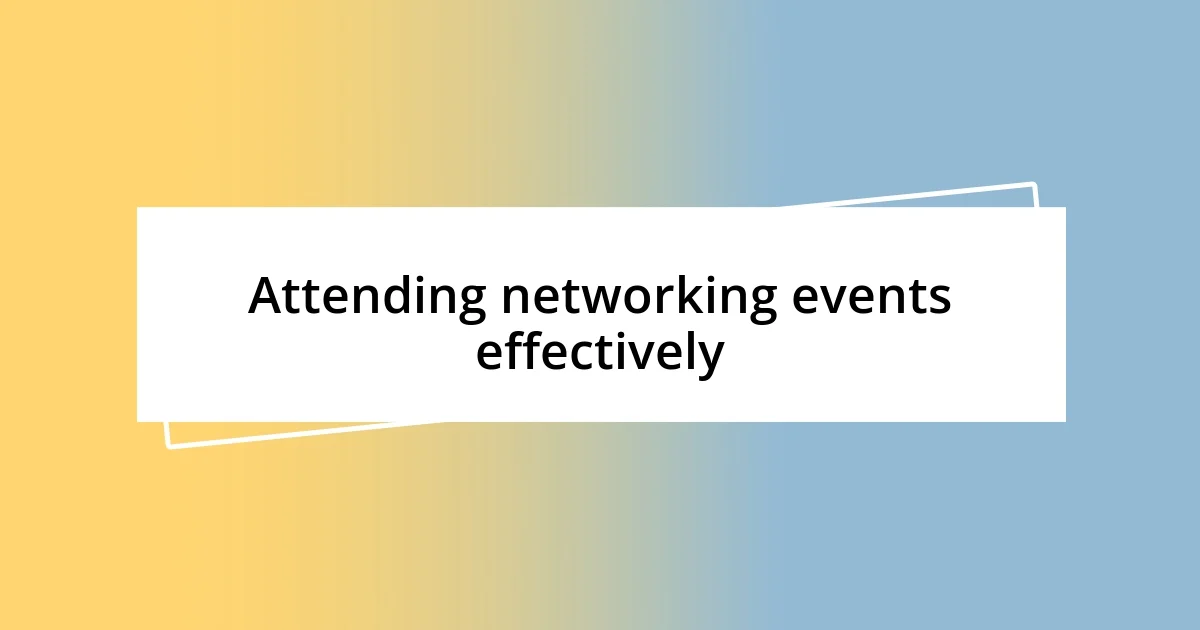
Attending networking events effectively
Attending networking events turns out to be more than just showing up; it’s about engaging with intention. I still remember that one tech conference where I was a bit hesitant at first. But as I stepped into the buzzing atmosphere, I made a conscious effort to approach someone sitting alone at a table. That simple act sparked a fascinating conversation, and I discovered that this person had experiences in areas I was eager to explore. Isn’t it amazing how a single interaction can lead to new opportunities?
As I immersed myself in these events, I learned the value of preparation. Before attending a meetup, I would research the speakers and participants, jotting down a few questions to spark conversation. I recall chatting with a panelist about recent developments in AI, which not only deepened my understanding but also led to a follow-up coffee chat later. Being prepared gave me the confidence to engage meaningfully. Have you ever found that having a few conversation starters in your back pocket makes the experience less daunting?
Another key takeaway from these networking events is the importance of follow-up. After one particularly inspiring tech summit, I made it a point to connect with people on LinkedIn, sending personalized messages to those I felt a connection with. I still treasure the advice I received from a mentor whose words on that day shifted my perspective on career growth. Consistently nurturing these relationships has proven crucial; after all, it’s not enough to just meet people—you have to keep the dialogue going to turn those initial connections into lasting mentorships.
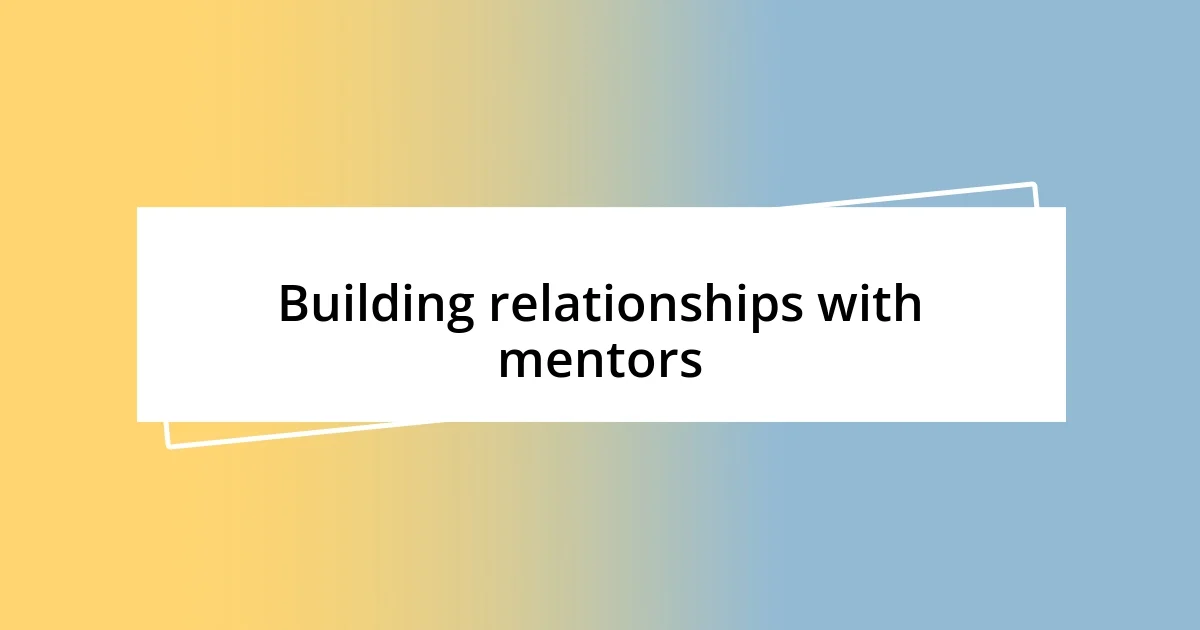
Building relationships with mentors
Building relationships with mentors is a journey that often begins with a simple conversation. I can’t forget the day I reached out to someone I admired through an online forum. My heart raced as I typed my message, asking for advice on a project I had been working on. To my surprise, not only did they respond, but they also offered to meet for coffee. That initial leap of faith transformed into a meaningful relationship, fostering guidance and support I hadn’t anticipated.
I’ve realized that authenticity is key to nurturing these connections. During a casual lunch with a mentor, I opened up about my fears regarding career decisions. Their empathetic response made me feel validated and understood. It’s interesting how vulnerability can create a deeper bond, right? Sharing personal experiences and challenges often allows mentors to relate to you on a level that fosters trust and respect. I’ve found that the more genuine I am, the stronger our relationship becomes.
Consistency matters, too. If you genuinely value your mentor’s insights, make it a habit to check in regularly—share your progress and ask for feedback. I remember sending a quick message to a mentor after completing a challenging project, their reply igniting a renewed sense of purpose in my work. Have you felt that spark of motivation when someone acknowledges your efforts? It’s in these moments that relationships evolve from mere acquaintances to a robust support system, one that can guide you through both triumphs and setbacks.
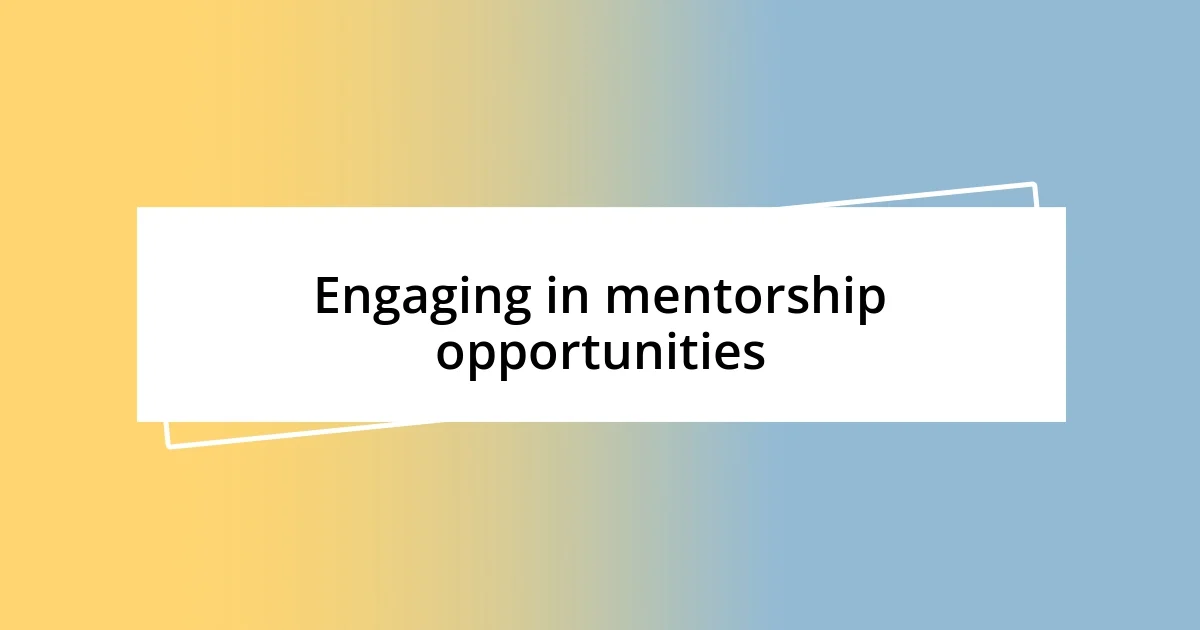
Engaging in mentorship opportunities
Engaging in mentorship opportunities often requires stepping outside your comfort zone. I remember attending a local tech workshop where I felt out of place among experienced professionals. Surprisingly, I decided to introduce myself to a mentor who was speaking that day. Sharing my aspirations sparked a dialogue that revealed his willingness to guide me through my career complexities. Have you ever noticed how a simple greeting can open doors to invaluable insights?
The value of workshops and group sessions cannot be overstated. I once participated in a coding boot camp where mentorship was woven into the experience. Working alongside seasoned developers, I absorbed not only technical skills but also gained insights into their career paths. It’s fascinating how collaboration can elevate your learning and connect you with mentors who truly care about guiding others. Engaging in these opportunities transformed my understanding of community and support in the tech world.
One fruitful strategy I’ve employed is volunteering at tech events, which simultaneously broadens my network and deepens my engagement with potential mentors. I recall volunteering at a hackathon, where I met a mentor who later became instrumental in shaping my projects. While assisting participants, I learned to approach mentors not just as teachers but as colleagues and friends. This shift in mindset fostered richer conversations. Have you tried volunteering for the dual purpose of giving and learning? It’s rewarding in ways that extend beyond gaining knowledge—often, you find mentors who genuinely appreciate your contributions.
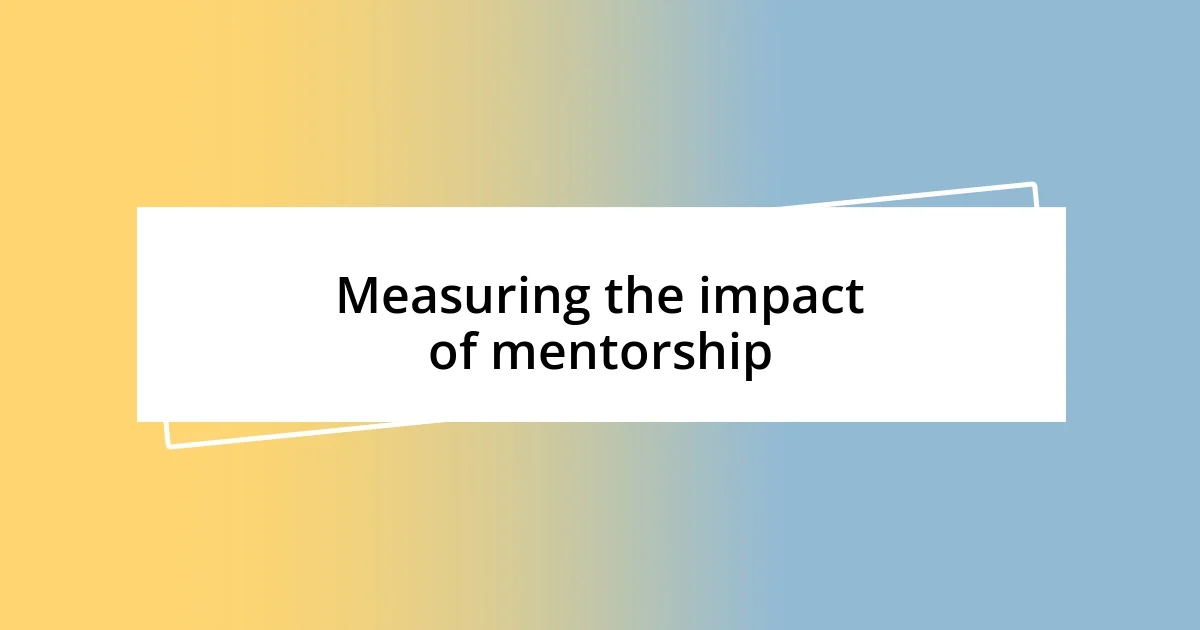
Measuring the impact of mentorship
Measuring the impact of mentorship can sometimes feel intangible, yet its effects resonate profoundly in our careers. For instance, after working with a mentor, I noticed not only my confidence growing but also my ability to tackle challenging projects independently. Have you ever felt a shift in your mindset after receiving guidance from someone you respect? The transformation is subtle but powerful—a confident individual who can navigate obstacles with newfound clarity.
I believe it’s essential to reflect on specific milestones to gauge mentorship’s effectiveness. Once, after several months of collaboration, I was invited to present my work at a tech conference. The support and encouragement I received from my mentor were crucial in that moment, and it was validating to see my effort recognized publicly. Isn’t it rewarding when someone’s belief in you stimulates your growth? Measuring success through tangible achievements like this provides a clear picture of mentorship’s value.
Moreover, I find that qualitative feedback plays an important role in assessing mentorship’s impact. During a review session, my mentor offered pointed constructive criticism, which initially stung but ultimately propelled me forward. This blend of support and challenge is where true growth occurs. Have you experienced a mentor pushing you beyond your comfort zone? Those moments can be the catalysts for significant personal and professional development, showcasing that mentorship is both a mirror and a compass guiding us on our journey.












